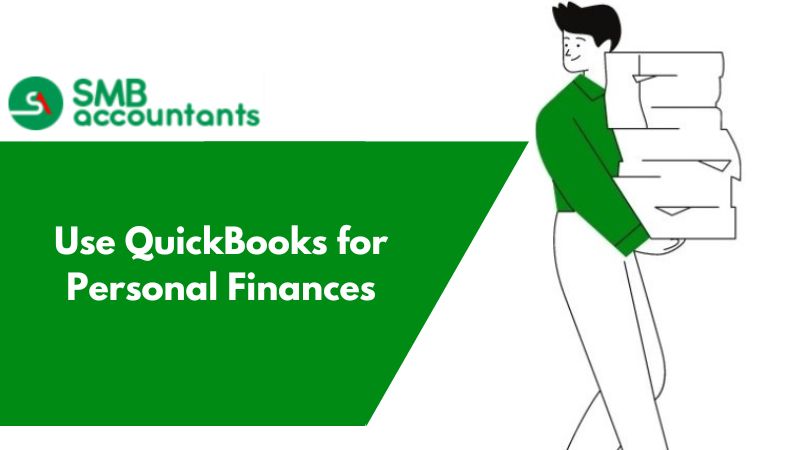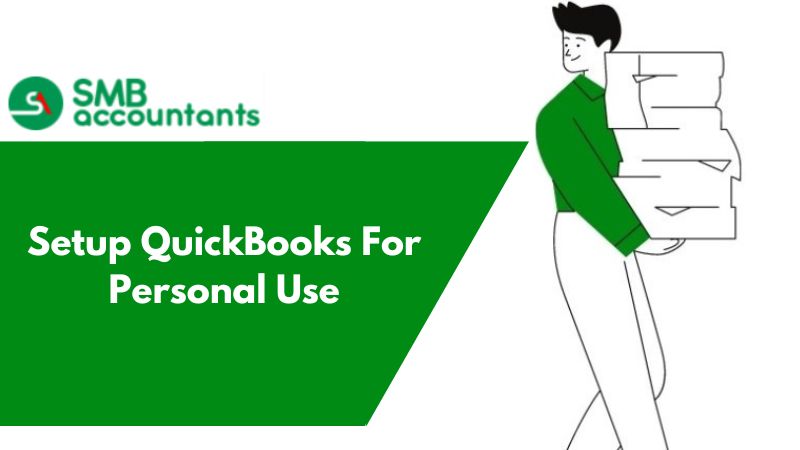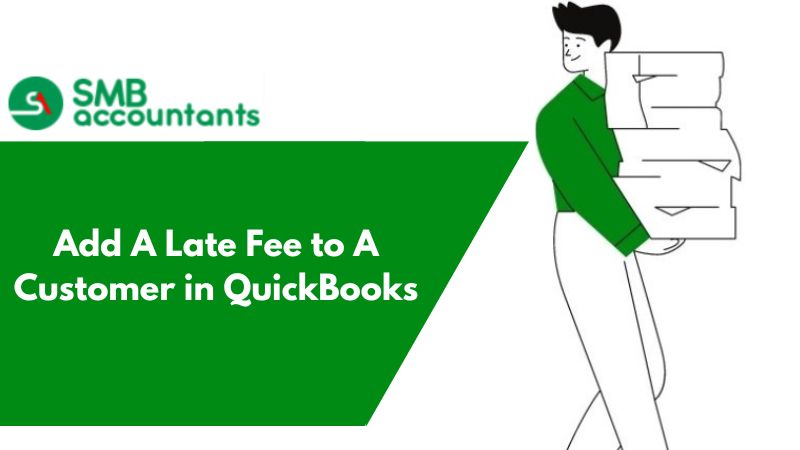It is simple to organize and use personal finance in QuickBooks. It allows the organization of payments, expenses, and other transactions from one place.
The answer to the question of whether QuickBooks can be used for managing personal finances or not is a big YES. QuickBooks is software that can be used for managing personal finances as well.
The features it provides ensure that even the person with little or no experience in accounting is also able to meet all the needs of their business. Though QuickBooks is labeled as business software it also manages personal finances in a tremendously efficient way.
How Does QuickBooks Work for Personal Finances?
Before delving into how QuickBooks can be beneficial for personal finances, let's provide a brief overview of some of the product's features that can be seamlessly adapted for personal use or managing your household finances.
- Budgeting
- Automation for Savings and Payments
- Management of Income and Taxes
- Financial Planning
- Tracking your Expenses
- Online Bill Payments
- Generate Customizable Reports
Tips for Using QuickBooks to Manage Your Finances
QuickBooks offers versatile options for managing your family's finances effectively. With the ability to easily track income and expenses from various sources, utilizing QuickBooks for personal money management is highly recommended. By leveraging the extensive features and benefits of QuickBooks, you can optimize your financial management and make informed decisions regarding your finances.
The following are a few examples of how you can manage your personal and family finances with QuickBooks.
Save Time by Automating Your Bills
Most individuals recognize the significance of making timely monthly payments and often arrange for automatic payment setups. The transaction is promptly recorded in the appropriate account, be it a credit card account or a bank account.
This also aids in savings and earnings. Utilizing a credit card for payments can offer individuals with credit card reward programs greater rewards and financial advantages compared to paying directly from a checking account each time.
This also aids in saving and generating income. Opting to make payments with a credit card may offer individuals who have credit card reward programs in place enhanced rewards and financial advantages compared to paying directly from a checking account on each occasion.
The Memorized Transactions feature facilitates the convenient entry of bills into your QuickBooks account as soon as they are received. Following this, you only need to modify and input the payable amount details and transaction date.
Maximize your Savings
Saving deposits can be automated, which is one of the most effective savings tools.
You may wish to arrange automatic transfers from your checking account to your savings account regularly. This ensures that funds are regularly moved from your checking account to your savings account without requiring manual intervention.
QuickBooks is an excellent tool for closely monitoring your cash flow, providing the flexibility to adjust the amounts you contribute to your savings each month based on any surplus remaining in your budget after all bills have been paid. This allows for efficient management of your finances and the ability to make informed decisions regarding your savings.
Manage Your Cash Flow Closely
One of the key benefits of utilizing QuickBooks for personal finances is the ability to effectively monitor your cash flow. By regularly entering your financial data from your accounts into QuickBooks (or integrating them using open-banking APIs, if applicable), you can maintain accurate records. This includes recording both past and future transactions, allowing you to anticipate your spending for the upcoming months, particularly if you have payments due shortly. This feature empowers you to have better control and planning over your financial obligations and helps you make informed decisions about your spending.
The "set-it-and-forget-it" feature in QuickBooks is ideal for managing recurring transactions that occur regularly, such as mortgage or loan payments, with infrequent amount changes. You can efficiently utilize QuickBooks' "Memorize Transactions" feature for this purpose. This user-friendly feature simplifies personal financial management in QuickBooks. Familiarize yourself with how to use this feature to save significant time and effort in your financial management tasks.
Regular Reconciliations
Cash-flow management primarily involves regular reconciliation, which should ideally be done on a bi-weekly or weekly basis. It is crucial to approach personal finances with the mindset of managing books diligently. QuickBooks offers robust reconciliation capabilities that grant you greater control over your spending. By consistently clearing your transactions through the bank, you can promptly identify and address any discrepancies, ensuring accurate and up-to-date financial records. This practice enables you to maintain financial stability and effectively track your finances.
Personal Financial Reporting with QuickBooks
Accessing the reporting options in QuickBooks is a valuable tip for effectively managing your finances. It is essential to regularly reconcile your QuickBooks account to ensure accurate usage of QuickBooks for personal financial management. This practice applies to credit card accounts and loan accounts as well. By diligently reconciling these accounts, you can quickly identify and address any potential issues, enabling you to stay informed and maintain financial control. Leveraging the reporting features in QuickBooks provides valuable insights and enhances your ability to make informed decisions regarding your money management.
Reconciling the account with a statement that includes start and end dates, as well as beginning and ending balances, is a crucial step. To begin, generate a simple and basic Profit and Loss Report, which can be viewed in various formats. Many individuals find it helpful to compare the current report with a previous one, as it provides a straightforward way to assess your financial situation. By conducting monthly and annual comparisons, any areas of concern can be easily identified at a glance. By focusing on these five goals using QuickBooks, you can gain a better understanding of your financial status, leading to more successful management of your finances.
How to Perform a Reconciliation with QuickBooks
The process is the same whether you reconcile daily, weekly, or biweekly.
- Navigate to the "Banking" section.
- Double-click on the bank account that requires reconciliation.
- The account register will open, displaying tick marks in the boxes of transactions that are not yet cleared.
- Enter the desired transactions that should appear in the selected account.
- To view the ending balance for the week or day, access your bank account or credit card account.
- In your bank register, modify the display options to show the cleared items.
What is the Best Way to Use QuickBooks for Personal Finances??
The process to use QuickBooks for managing personal funds is similar to what is followed to manage business accounting, there are minor differences that too just a few. There is a Wizard set-up that is built in the QuickBooks, it will help you to go through the steps that will help you to get started with managing your personal finances, once QuickBooks is installed.
If you have a savings account, checking account or any bank account then make sure that you use the Wizard setup to get the information connected to the QuickBooks.
In case you do not want to connect your financial accounts of yours with QuickBooks then the information could be added manually. You can use any of the ways, but by using the Wizard setup your energy and time will be saved.
Setting Up the Vendors in QuickBooks
To set up the vendor in QuickBooks:
- Tap on the tab of Vendor Center, which is present at your QuickBooks account’s top
- After that select New Vendor
This may initially appear to be a bit confusing, but vendors are part of the bills that you are paying when it comes to personal finances. For example, your cable bill, electric bill, rent, groceries, and car payment all are labeled as vendors.
Keep in mind that you have to get the new vendor created for the bill of each type. Once the vendors are set up get the transaction added to the account for the payments that were sent out by you.
Remember that every transaction should have a specific vendor that is associated with it. Keep on doing this for the complete month and you will be able to keep up perfectly with all your personal finances.
Three ways of Using QuickBooks to Manage your Finances
1. First Way: Managing the Cash Flow
With QuickBooks, you can easily manage your cash flow. Ensure that you are adding the financial data regularly in QuickBooks for all your accounts and later you can easily drill down on them to know the situation of your cash flow.
2. Second Way: Automating the Income and Bills
With QuickBooks, you can easily automate your savings income and bills. You do not have to keep manual track of your income and bills anymore. Keep your bills on the auto payment to hit the checking account or credit card. By selecting the option for a credit card, you can easily control your cash flow and in return, you can always win the rewards associated with a credit card.
3. Third Way: Reconciling the QuickBooks Account
To be sure that the reports you are looking at are accurate, ensure that your QuickBooks account is reconciled. It is of vital importance to reconcile all your QuickBooks accounts and not just the bank accounts.
Issues that users face while managing personal finance on QuickBooks
You may not be aware of which version of QuickBooks you can use to manage your personal finances.
Need Professional Help?
There might be other issues that you may face and to get the correct and satisfactory answers of the same, you can always get in touch with our SMB QuickBooks tech support helpdesk. Experts at SMB are always ready to serve you.
Frequently Asked Questions
What includes personal finance?
Personal finance covers components regarding money management, including both saving and investing. It contains budgeting, insurance, banking, mortgages, retirement planning, investments, and tax and estate planning.
Can I use QuickBooks for managing my personal finances?
Yes, QuickBooks is one of the outstanding tools to manage both business finance and personal bookkeeping. You can easily manage bills, and income, and run the financial reports related to personal finances for better management of personal books.
Which features can I implement for personal finances in QuickBooks?
- Cash flow management
- Automate income and bills
- Financial reporting



